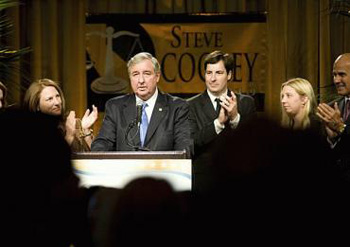
Steve Cooley, the Los Angeles County district attorney, regained the lead during the weekend. (David Zentz / AP)
It's been seven days since the election, but in a highly unusual situation, the outcome of California's attorney general race remains up in the air - leaving political observers perplexed and the campaigns of Steve Cooley and Kamala Harris waiting anxiously for counties around the state to complete their ballot counts.
The unusual tightness of the race has thrown the state's tallying process into the spotlight and left both campaigns readying their lawyers, in case there's any need for a legal challenge. Harris' camp is also monitoring vote tabulation in counties around California.
As of late Monday, Republican Cooley led Democrat Harris by a fraction of a percentage point.
Since last week, the results have yo-yoed almost daily. Cooley, the district attorney in Los Angeles, claimed a large lead out of the gate Tuesday night, but by Wednesday morning Harris, San Francisco's top prosecutor, had pulled ahead. Over the weekend, Cooley again was on top.
Historically tight
Polls had showed the two district attorneys locked in a one-point race the week before the election. Longtime political observer Barbara O'Connor said the closeness of the contest for a state office might be unprecedented in California.
"This is highly unusual. ... In 30 years, I can't think of any other races like this," said O'Connor, a Cal State Sacramento political communications professor emerita.
The tightness of the race is particularly interesting, she said, because Democrats easily won the rest of the statewide offices. However, given the polling, "I'm not really surprised," O'Connor said, "but it is painful for it to go on this long."
More than 7 million votes have been counted, but just eight of California's 58 counties have completed their individual tallies. The remaining jurisdictions have about 2.12 million ballots left to count, according to the secretary of state.
There are hundreds of thousands of uncounted ballots in Democratic strongholds such as Los Angeles and Alameda counties and in overwhelmingly Republican-leaning counties such as San Diego and Orange.
Some hand-counting
Most of those that remain uncounted are either vote-by-mail or provisional ballots; local officials must also count, by hand, any ballots that could not be tabulated by machines because they were damaged or include write-in candidates.
And county registrars are required by law to manually audit all of the ballots from 1 percent of precincts to ensure that the results are accurate. The entire process of counting and verifying ballots, called the postelection canvass, must be completed by Nov. 30.
Once the counties certify their results, by Dec. 3, they hand their findings over to the secretary of state's office. The state agency then has seven days to review the material and certify the results - meaning voters may not know the official outcome until Dec. 10.
It's unlikely that a high-drama, statewide recount - as happened in Florida after the 2000 presidential election - will occur, O'Connor said.
For a recount to take place under California law, a voter must file a written request with his or her county within five days of the postelection canvass being completed. The voter seeking the recount must specify which candidate he or she is filing on behalf of and put down a deposit daily to pay the cost of the recount. If the recount shows a different result from the official canvass, the deposits would be returned.
Close 2002 race
"I'd guess that whoever ends up ahead by a sizable margin will graciously concede," O'Connor said.
She said the tightest statewide race in recent history - 2002's contest between Democrat Steve Westly and Republican Tom McClintock for state controller, which Westly won by 16,000 votes - was nowhere near the roller-coaster ride seen in this year's attorney general election.
"That was close, but not this close - on election night, Harris was losing, then she was winning, and now she is losing again," she said. "It will be a photo finish."
Meanwhile, both campaigns are preparing for a potential legal battle.
"We have legal counsel prepared, and we are monitoring the situation in key counties," said Cooley spokesman Kevin Spillane. "There are still a lot of votes to be counted. We are ... cautiously optimistic."
Volunteer monitors
Harris' camp announced Monday that it has recruited more than 1,000 volunteers from around the state to monitor ballot counting. Counties have different rules - some allow observers to watch the count, and others do not.
Harris spokesman Brian Brokaw said the campaign also has attorneys ready, and he remained confident the Democrat will ultimately prevail.
"In order to get a sense of what's going on in the 58 counties, we need monitors on the ground," he said. "We have a large chunk covered already, and we are hoping to have as close to 58 as we can. ... They are keeping their eyes and ears open to any new information."
The attorney general race isn't the only outstanding contest: Two of California's congressional races also remain too close to call. In the 11th District, Democratic incumbent Jerry McNerney leads David Harmer by 624 votes, and in the Central Valley's 20th District, Republican challenger Andy Vidak leads incumbent Jim Costa by 618 votes.











